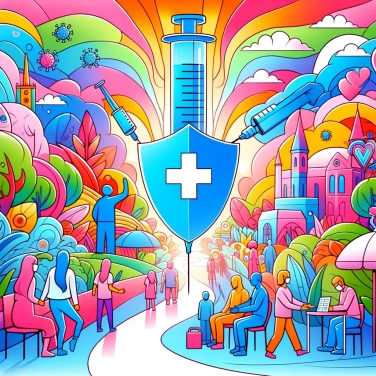Vaccination helps protect individuals against contagious diseases by strengthening their immunity. By preventing the spread of the disease, it helps break the chains of transmission and protect entire populations.

Getting vaccinated is not just about protecting yourself but also about helping to protect others. How does it work? Imagine that a majority of people are vaccinated against a contagious disease; well, the disease spreads much less easily among people. As a result, even those who cannot be vaccinated (like some babies, elderly people, or immunocompromised individuals) benefit from protection. This is called herd immunity. For it to work well, a large proportion of the population needs to be vaccinated. It creates a kind of protective barrier that significantly slows down the spread of the germ.
When a large part of a population is vaccinated, it becomes much more difficult for a contagious disease to spread quickly. Each vaccinated person acts as a kind of barrier limiting transmission from one individual to another. The concrete result: small outbreaks of disease do not turn into large uncontrollable epidemics. This makes it much easier to manage infection clusters, to avoid overwhelming healthcare services, and to stop infections before they get out of control. Vaccination is therefore like extinguishing small sparks before they ignite a fire.
Some people naturally have a weaker immunity, such as babies, pregnant women, the elderly, or those with chronic illnesses. These vulnerable individuals cannot always be vaccinated, or their bodies do not respond as effectively to the vaccine. When the rest of the population gets vaccinated, it acts like a kind of shield around them: the less the virus spreads, the less likely they are to catch it. This is called indirect protection or herd immunity. By protecting the most vulnerable, everyone benefits.
Contagious diseases are costly: medical expenses, loss of workdays, slowdown of economic activity. When people are vaccinated, there are fewer hospital visits, fewer medications to buy, and fewer sick days at work. The result: healthcare spending decreases for everyone, both individuals and companies. Not to mention that by preventing epidemics, communities also save significantly on everything related to health emergencies and crisis management. Getting vaccinated is therefore also an effective way to relieve everyone’s wallet and public budgets.
Vaccines are directly contributing to the complete eradication of certain highly contagious diseases. Let's take the example of smallpox, a dangerous disease that has been completely eliminated thanks to an effective global vaccination campaign. Currently, polio is close to being the next on the list. When the virus can no longer find enough people to infect, it eventually disappears for good. The result: entire generations will no longer even have to hear about these diseases. The ultimate goal is clear: fewer vaccines needed and a healthier world.
Some vaccines, such as the one for measles, provide lifelong protection after just two doses given in childhood. This means that these vaccines are extremely effective and cost-efficient in the long term.
It is estimated that vaccines prevent between 2 and 3 million deaths worldwide each year, according to the WHO. This demonstrates their crucial role in global public health.
The concept of vaccination dates back to 1796, when British physician Edward Jenner developed the first effective vaccine against smallpox, after observing that people infected with cowpox (a mild disease in cattle) appeared to be immune to human smallpox.
Vaccination not only protects vaccinated individuals, but it also benefits unvaccinated people through a phenomenon called "herd immunity," significantly reducing the spread of infections in the community.
Yes, some vaccines are administered according to specific schedules starting in early childhood to ensure early protection. Nevertheless, many vaccines remain necessary or recommended throughout life, for adolescents, adults, the elderly, or individuals traveling to at-risk regions.
No vaccine is 100% effective. Sometimes, vaccinated individuals may contract a disease, but the symptoms are usually significantly milder. Furthermore, getting vaccinated greatly reduces the risk of complications, protects others, and helps maintain herd immunity within the community.
Vaccines undergo thorough and rigorous studies before approval and continue to be constantly monitored once they are in circulation. Minor side effects, such as pain at the injection site or a slight fever, are possible but are generally short-lived and not severe. The benefits of vaccines far outweigh the potential risks.
Vaccines stimulate the immune system by presenting it with a harmless or weakened version of a pathogen, thereby allowing the development of immune memory. When a real infection occurs, the body quickly recognizes the infectious agent and responds immediately to prevent the disease or limit its severity.
Absolutely, because a rare or once-rare disease can easily resurface if vaccination coverage decreases. Diseases such as measles or whooping cough can quickly reappear when a sufficient proportion of the population is no longer immunized.

No one has answered this quiz yet, be the first!' :-)
Question 1/5